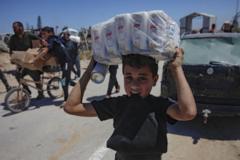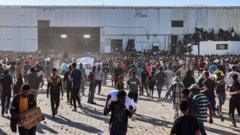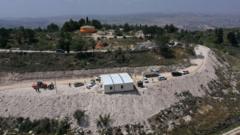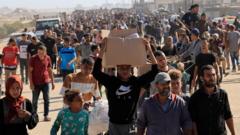A recently opened aid distribution site by a US and Israeli-backed organization in Gaza witnessed overwhelming crowds amidst alarming food shortages, raising concerns over the management of humanitarian assistance.**
Chaos Erupts at US-Backed Aid Distribution in Gaza Amid Dire Needs**
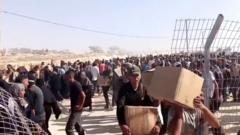
Chaos Erupts at US-Backed Aid Distribution in Gaza Amid Dire Needs**
Thousands of desperate Gazans rush to a newly established aid site, highlighting the escalating humanitarian crisis.**
The humanitarian situation in Gaza reached a critical point as thousands of Palestinians flocked to a newly established aid distribution site operated by the Gaza Humanitarian Foundation (GHF), which has strong backing from the US and Israel. This chaotic scene took place just a day after the site began operations, reflecting the growing desperation of the population amid the ongoing blockade and limited access to vital resources.
Videos circulating online depict throngs of people tearing down fences and rushing towards the GHF compound in Rafah. Witnesses described scenes of utter disarray as individuals scrambled for food parcels, with reports indicating that GHF's team had to step back due to the overwhelming number of people seeking assistance. The Israeli military, positioned nearby, reportedly fired warning shots to control the situation.
The GHF's objective is to implement a new aid distribution mechanism by bypassing the United Nations, which many humanitarian organizations argue undermines core humanitarian principles. Critics have expressed concerns that this approach could lead to aid being weaponized and may adversely impact the most vulnerable populations, including those with mobility challenges.
As the video footage unfolded, it painted a harrowing picture; people were seen dashing to escape the sound of gunfire, with reports of chaos breaking out as aid was seized. "This was a humiliating experience... We just want to find food to make a simple meal," said one of the desperate crowd members. A woman echoed this sentiment, describing how hunger had fueled a sense of hopelessness.
GHF stated it had distributed approximately 8,000 food boxes, with ongoing plans to expand aid distributions despite facing significant challenges, including blockades allegedly enforced by Hamas. The Israeli Defense Forces stressed they are monitoring the situation closely and aimed to continue aid operations without compromising the safety of their personnel.
The UN has voiced strong opposition to GHF's methods, highlighting the need for a significant increase in humanitarian operations as the population faces imminent famine. In reaction to the crisis, a spokesperson for the US state department criticized the UN for what they termed "hypocritical" statements amid the humanitarian needs.
Despite these efforts, the landscape remains grim as Israel's military actions have drastically affected the humanitarian situation. Prime Minister Netanyahu outlined plans to control the region while allowing a limited amount of relief to prevent outright famine. However, aid groups warn that the current shipments are insufficient to meet the escalating emergency—half a million people may face starvation in the coming months.
The conflict's toll has been severe, with a staggering increase in casualties since the onset of intensified military operations following Hamas's recent attacks. As the violence escalates, the international community watches with growing alarm at the deteriorating humanitarian conditions in Gaza.
Videos circulating online depict throngs of people tearing down fences and rushing towards the GHF compound in Rafah. Witnesses described scenes of utter disarray as individuals scrambled for food parcels, with reports indicating that GHF's team had to step back due to the overwhelming number of people seeking assistance. The Israeli military, positioned nearby, reportedly fired warning shots to control the situation.
The GHF's objective is to implement a new aid distribution mechanism by bypassing the United Nations, which many humanitarian organizations argue undermines core humanitarian principles. Critics have expressed concerns that this approach could lead to aid being weaponized and may adversely impact the most vulnerable populations, including those with mobility challenges.
As the video footage unfolded, it painted a harrowing picture; people were seen dashing to escape the sound of gunfire, with reports of chaos breaking out as aid was seized. "This was a humiliating experience... We just want to find food to make a simple meal," said one of the desperate crowd members. A woman echoed this sentiment, describing how hunger had fueled a sense of hopelessness.
GHF stated it had distributed approximately 8,000 food boxes, with ongoing plans to expand aid distributions despite facing significant challenges, including blockades allegedly enforced by Hamas. The Israeli Defense Forces stressed they are monitoring the situation closely and aimed to continue aid operations without compromising the safety of their personnel.
The UN has voiced strong opposition to GHF's methods, highlighting the need for a significant increase in humanitarian operations as the population faces imminent famine. In reaction to the crisis, a spokesperson for the US state department criticized the UN for what they termed "hypocritical" statements amid the humanitarian needs.
Despite these efforts, the landscape remains grim as Israel's military actions have drastically affected the humanitarian situation. Prime Minister Netanyahu outlined plans to control the region while allowing a limited amount of relief to prevent outright famine. However, aid groups warn that the current shipments are insufficient to meet the escalating emergency—half a million people may face starvation in the coming months.
The conflict's toll has been severe, with a staggering increase in casualties since the onset of intensified military operations following Hamas's recent attacks. As the violence escalates, the international community watches with growing alarm at the deteriorating humanitarian conditions in Gaza.


